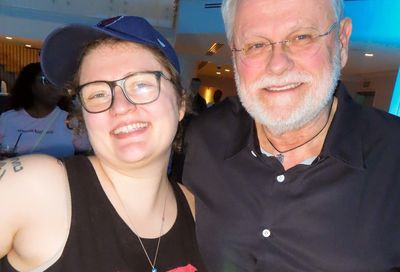Jack's Back
About Schmidt
A little too low key for its own good, About Schmidt amounts to much less than the sum of its parts.
 |
“I don’t know whether to be happy or ashamed, ” said Jack Nicholson of his Golden Globe win last Sunday night for Best Dramatic Performance in About Schmidt, “because I thought we made a comedy. ”
That may be. But while the tone of Alexander Payne’s latest film veers toward the offbeat and mildly amusing, Nicholson’s richly understated portrayal of a 66-year-old man coping with retirement and the death of his spouse, is as dramatic a performance as they come. It’s a solid piece of acting, a strong display of character development, and it thankfully lacks the over-the-top histrionics that have plagued some of his more recent performances.
Payne’s third major feature film, About Schmidt lacks the social fangs of Citizen Ruth and the verve and satirical bite of Election, which remains the young director’s work-to-beat. Working again with screenwriter Jim Taylor, and drawing from Louis Begley’s novel, Payne crafts the story of Warren Schmidt, who, sensing his overall failure in life, sallies forth on one final mission — to prevent his daughter from marrying a thick-skulled but well-meaning dolt. En route from his home in Nebraska to the wedding in Colorado, Schmidt undergoes a series of small revelations and epiphanies. While these don’t exactly change him as a man — change comes hard, after all — they do help him grow accustomed to his new life.
We first meet Schmidt during his final minute on the job with a major insurance company. He sits in his office silently, awkwardly, years of work tidily packed away into boxes, awaiting the clock’s final tick. At 5 p.m., Schmidt’s life changes forever and he is plunged into an existential crisis. His life’s work, he later finds, is relegated to the dumpster. Meanwhile, his irritation with his incessantly optimistic wife (June Squibb) — the dominant force in their marriage (she’s even trained him to pee sitting down) — has grown exponentially. Numbed by ennui, and seething with repressed anger, Schmidt is ripe for catalyst.
That catalyst comes quickly, as his wife suddenly drops dead, leaving Schmidt helpless and in a state of panic. “Who’s gonna take care of me? ” he says, nervously, to his daughter, Jeannie (Hope Davis). At the same time, he boldly suggests she “rethink her wedding plans ” to the handle-bar mustached, mullet-sporting Randall Hertzel (Dermot Mulroney). Jeannie, in turn, fires back: “Dad, why did you get mom such a cheap casket? ” “There was one less expensive than that model, ” he protests. “What, the pine box? ” is her icy reply.
|
The relationship between father and daughter is strained, and the movie is at least courageous in not trying to mend the fence, Hollywood style. In the real world, fractured familial relationships are not healed in the final reel, and in the case of About Schmidt, it’s clear that the emotional chasm between father and daughter may never close.
The movie’s most entertaining portion details Schmidt’s journey through his past (his childhood home is now the site of a tire store), as he winds through the Midwest in an obscenely huge 35-foot Winnebago Adventurer. It’s during this sequence that Payne’s gift for visual humor reaches its apex — a shot of porcelain figurines sliding off the Winnebago’s roof, for instance, is inspired. But there are also several narrative stumbles, including Schmidt’s desperate advance to an understanding married woman in a recreational vehicle park. Schmidt gets his chance for amore later — in a hot tub with Randall’s free-spirited, sexually charged mother (Kathy Bates, in an effervescent role).
Aiding in telling the story — and relating the character’s inner-monologue to us — is Schmidt’s correspondence with Ndugu, a six-year-old Tanzanian boy whom he sponsors for $22 a month. The letters he writes to the young African are littered with inappropriate comments, revealing Schmidt’s lack of understanding of the world beyond Omaha. (“I highly recommend you pledge a fraternity when you go to college, ” he writes at one point.)
About Schmidt may be a little too low key for its own good. Payne gets great performances from a fine cast, and continues to exhibit a gift for striking visuals, but the movie never quite gels. Yes, it’s an enjoyable enough two hours, but ultimately, it amounts to much less than the sum of its parts.
Support Metro Weekly’s Journalism
These are challenging times for news organizations. And yet it’s crucial we stay active and provide vital resources and information to both our local readers and the world. So won’t you please take a moment and consider supporting Metro Weekly with a membership? For as little as $5 a month, you can help ensure Metro Weekly magazine and MetroWeekly.com remain free, viable resources as we provide the best, most diverse, culturally-resonant LGBTQ coverage in both the D.C. region and around the world. Memberships come with exclusive perks and discounts, your own personal digital delivery of each week’s magazine (and an archive), access to our Member's Lounge when it launches this fall, and exclusive members-only items like Metro Weekly Membership Mugs and Tote Bags! Check out all our membership levels here and please join us today!




















